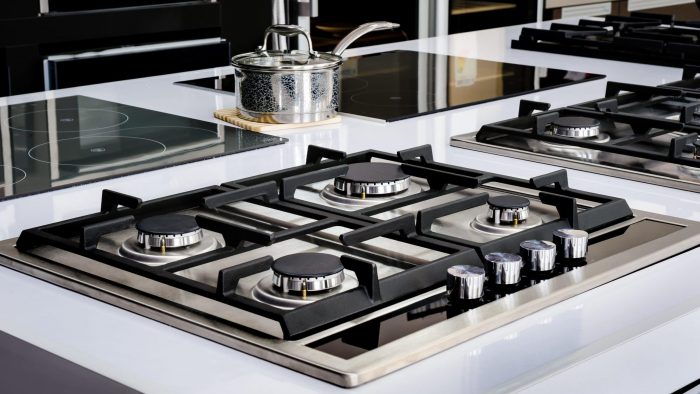
Are you in the market for a new cooking range? You should choose an appliance that is known for its craftsmanship and durability. Before you can choose a specific brand or product, however, you will have to choose a method of heating for your cooktop: induction, gas, or electric.
At Apex Appliance, our range repair technicians have experience with multiple types of ranges and cooktops. No matter which heating method you choose, we will be there for you if your appliance malfunctions or breaks.
What Is a Cooktop? Or a Range?
Your is the surface on which you place your pots and pans to cook food, boil water, and more. It can also be called a “hob.” Cooktops include burners that heat food and cookware—we will get to those heating methods later.
combine cooktops with ovens to create an all-in-one cooking appliance for your kitchen. Most families have a range in their kitchen. Your oven will likely run on either gas or electric heat, but your cooktop has a third option for heating: induction.
Let us take a closer look at these 3 heating methods so you can determine which works best for your kitchen needs.
Gas Cooktop: Pros and Cons
Gas was first used for cooking in 1802. Yet, it was not until the 1830s, that gas stoves became available for purchase by the general public.
Although improvements have been made to gas cooktops since then, the science remains mostly the same. You turn on the gas and ignite the burners, creating a flame which you can increase or decrease with more or less gas. This flame can heat a pot or pan placed directly on top of it.
Pros
are beloved by professional chefs and bakers. They are easy to heat and easy to control. In particular, more control allows chefs to implement some cooking methods, such as grilling or simmering, with more skill and nuance than other cooktops.
Cons
Gas burners use an open flame. The gas must be ignited with a pilot light in order to create heat. If your pilot light goes out, you may need to call our gas range technicians for a new part.
Gas ranges can leak, or you can accidentally leave your gas cooktop on without igniting it, releasing unhealthy quantities of gas into your home.
Electric Cooktop: Pros and Cons
In 1896, William S. Hadaway Jr. received the first U.S. patent for an electric stove. However, it took until the 1930s and 1940s before electric ranges really gained popularity.
Electric ranges use—you guessed it—electricity to heat elements within the cooktop. This heat then radiates to any pots or pans placed on top of these elements, allowing you to cook. Knobs and dials are used to control the level of heat for each element.
Pros
Electric cooktops are simple to use and easier to clean than gas ranges. You do not have to deal with an open flame, and you do not have to worry about gas leaks. Cooking with an electric range also tends to keep your kitchen cooler than cooking on a gas range.
Cons
Unfortunately, there are downsides to having an electric cooktop. They are slower than their gas counterparts, and they tend to use more energy. It is also easy to forget if the cooktop is on because there is no visible flame, potentially leading to more burns. If you damage your range, you may need to call our electric range repair technicians for help.
Induction Cooktop: Pros and Cons
The science of induction cooking dates back to the , but the first induction cooktops were not sold until the 1970s.
Both gas and electric cooktops use radiant heat to cook food. That means that something else is heated—a gas flame or an electric coil—that then heats a pot or pan, which then heats the food. The heat radiates from the original source to the cookware and then to the food itself.
Induction heating uses electromagnetic energy to heat pots and pans directly. This skips the step of heating a flame or coil first.
Pros
Induction heating is more efficient than gas or electric. It uses less energy to heat more quickly. Additionally, the cooktop itself stays cool while heating your cookware. That means there is less risk of burns if you accidentally touch your cooktop while making dinner.
Induction cooktops offer the same flat surface as electric cooktops, making them easy to clean. However, if food spills onto your induction cooktop, it will not burn, because the cooktop itself is not heated—only your pot or pan is. That makes induction cooktops even easier to clean than electric alternatives.
Cons
Induction cooktops are not as mainstream as gas or electric yet, but they are slowly gaining in popularity. However, because they use electromagnetic energy, you will need to use pots and pans with magnetic bottoms in order to use an induction cooktop.
Repair Your Range No Matter the Type
Our can fix your cooktop no matter if it uses gas, electric, or induction heating. Call Apex Appliance today at (616) 363-9894, or contact us online.